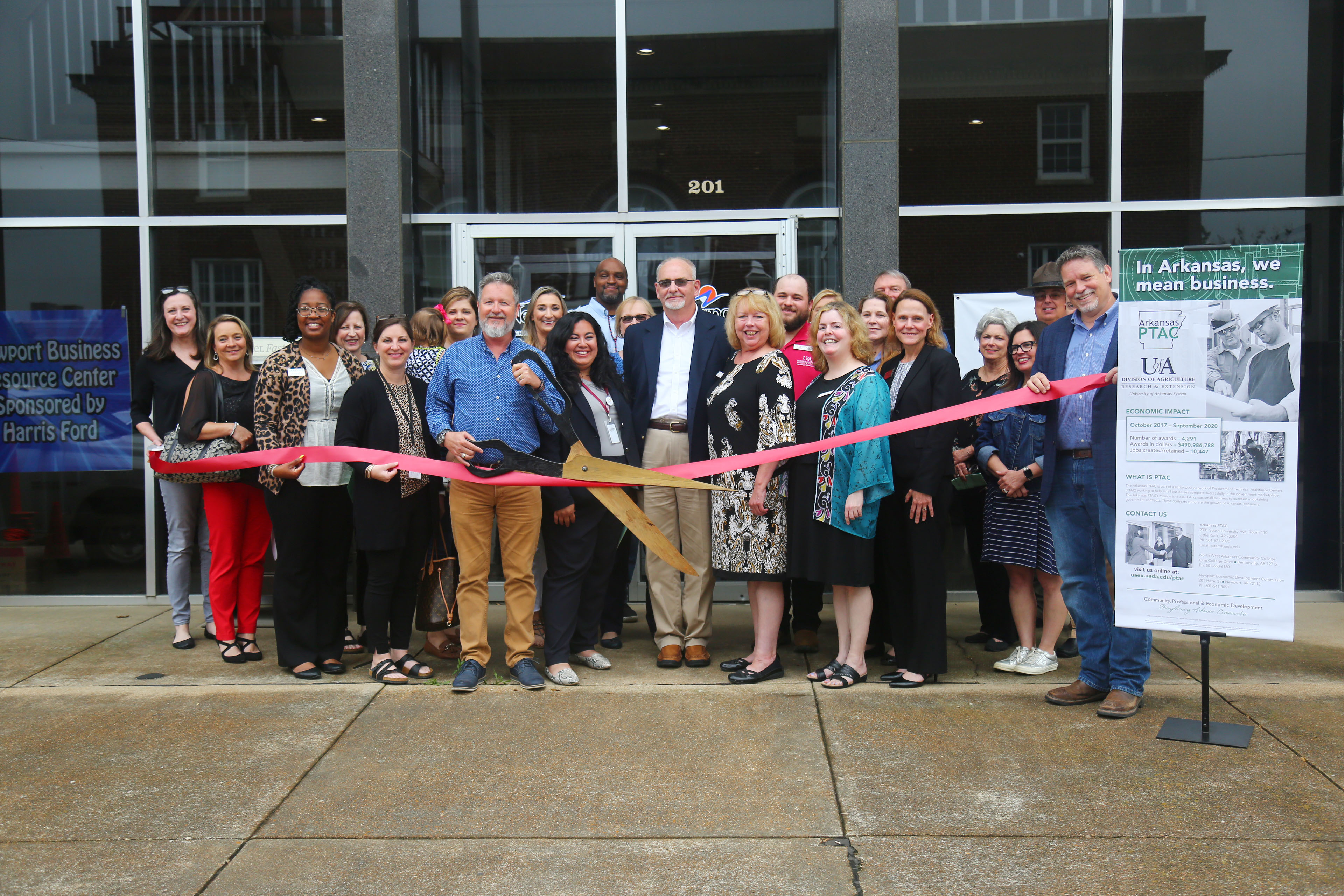July 16, 2021
After COVID, Arkansas Procurement Technical Assistance Center expands in-person outreach across state
By Ryan McGeeney
U of A System Division of Agriculture
Fast Facts:
- Arkansas APEX Accelerator helps small businesses understand government contract bidding system
- Organized 80 events; provided more than 2,250 hours of counseling last year
- APEX Accelerator plans to provide increased number of in-person and virtual training sessions
(611 words)
(Newsrooms: With file art at https://flic.kr/p/2m3ugzc)
LITTLE ROCK — 2020 was tough on many businesses throughout Arkansas, stunting some and shuttering others. As the COVID-19 pandemic erupted across the country, the Cooperative Extension Service changed the way it typically interacts with Arkansans to continue outreach, often transitioning from in-person meetings and events to online webinars and Zoom sessions.

As vaccination rates continue to rise and COVID-related restrictions are relaxed, the Arkansas Procurement Technical Assistance Center, part of extension’s Community, Professional and Economic Development Center, is shifting into high gear, scheduling a raft of both in-person and “hybrid” events, which livestream those events to participants across the state, all while continuing regularly-scheduled visits.
The mission of Arkansas APEX Accelerator — which has sister organizations in states throughout the country — is to help small businesses understand the process of bidding for contracts with local, state and federal governments, from the “onboarding” and certification process to ongoing interactions with those agencies. Its mission aligns with that of its parent organization, the University of Arkansas System Division of Agriculture.
Melanie Berman, APEX Accelerator program manager, said that while there is normally a rush of introductory programs from APEX Accelerator each summer, 2021 will be something more.
“We’re really heavy with intro classes right now, in part because we’re expanding our reach across the state,” Berman said. “We want to make sure businesses understand how we can be of assistance before we teach them about the specifics of marketing to the government, vendor registrations and small business certification programs.”
Setting, reaching goals
Like many grant-funded efforts, APEX Accelerator must set and achieve measurable goals each year to justify its funding. For APEX Accelerator, those include goals for obtaining new clients, holding events and providing “office hours” — one-on-one counseling sessions with small business owners, helping them to navigate specific challenges.
From July 1, 2020, through June 30, 2021 — the very thick of the COVID-19 pandemic in the United States — Arkansas APEX Accelerator not only met those goals, but also crushed them. The program obtained more than 560 new clients, exceeding a goal of 425; held 80 events, the goal was 65; and provided more than 2,250 hours of counseling, beating their 1,800-hour goal by 25 percent.
Berman said that during that time, Arkansas businesses were awarded more than 1,800 government contracts for goods and services, worth about $189 million.
Higher bar
Berman said that while she wasn’t sure where the bar will be set for the new year, it will be higher.
Berman said that Arkansas APEX Accelerator will be working increasingly with partner organizations throughout the state, ranging from chambers of commerce to local entrepreneurial innovation institutions such as The Conductor in Conway, The Generator in Pine Bluff and Startup Junkie in Northwest Arkansas.
“With many of these partners, we’ll be doing monthly or quarterly trainings, either virtually or in-person,” she said. “We’ll also have open office hours, having a staff counselor go to a given location, and advertise that, and have that person set up appointments for our clients who are interested in selling to the government.”
In June, the program opened a satellite office in Newport, situated in Jackson County, about two hours northeast of Little Rock. The purpose of the office is to make APEX Accelerator services and counseling more accessible to business owners in one of the state’s many financially distressed areas. More than half of all Arkansas counties are considered “distressed,” as measured by medial income level, unemployment rate or both.
“We’re expanding our reach, now that we’ve opened up the Newport Center,” Berman said. “There are some partners that we work with — the Chamber in De Queen, for example — with whom we’re only now able to get ‘back into action,’ post-COVID, and we’re really ramping up.”
To learn about extension programs in Arkansas, contact your local Cooperative Extension Service agent or visit uaex.uada.edu. Follow us on Twitter and Instagram at @AR_Extension. To learn more about Division of Agriculture research, visit the Arkansas Agricultural Experiment Station website: aaes.uada.edu. Follow on Twitter at @ArkAgResearch. To learn more about the Division of Agriculture, visit uada.edu. Follow us on Twitter at @AgInArk.
About the Division of Agriculture
The University of Arkansas System Division of Agriculture’s mission is to strengthen agriculture, communities, and families by connecting trusted research to the adoption of best practices. Through the Agricultural Experiment Station and the Cooperative Extension Service, the Division of Agriculture conducts research and extension work within the nation’s historic land grant education system.
The Division of Agriculture is one of 20 entities within the University of Arkansas System. It has offices in all 75 counties in Arkansas and faculty on five system campuses.
Pursuant to 7 CFR § 15.3, the University of Arkansas System Division of Agriculture offers all its Extension and Research programs and services (including employment) without regard to race, color, sex, national origin, religion, age, disability, marital or veteran status, genetic information, sexual preference, pregnancy or any other legally protected status, and is an equal opportunity institution.
# # #
Media contact:
Ryan McGeeney
Communications Services
University of Arkansas System Division of Agriculture
Cooperative Extension Service
(501) 671-2120
rmcgeeney@uada.edu